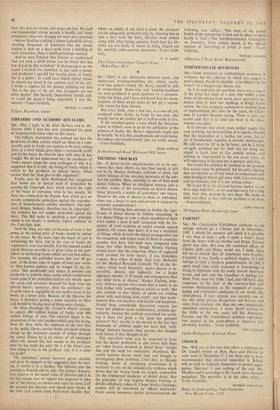SIR,—Your comment on indeterminate sentences is welcome, but the criterion
by which you suggest a man's release should be decided—is he fitted to be let loose?—is a dangerously thorny one.
As if to underline the problem, there was a report in the press last week of a man who within a few hours of his release from seven years' preventive de- tention tried to steal two mailbags at King's Cross station. He was promptly sentenced to another dose of imprisonment, this time for ten years, the Chair- man of London Sessions saying, 'There is only one course and that is to send you back to the place whence you came.'
It is obvious that seven years neither taught this man anything, nor deterred him. It is equally obvious that the imposition of a further ten years, for an a4 of boneheaded stupidity, is morally indefensible. He will never be 'fit' to be let loose, and he is being savagely punished not for theft but for being too stupid to learn how to live outside prison—and nothing he experienced in the last seven years, or will experience in the next ten, is going to alter him.
Nor could this sentence be justified on the grounds that society must be protected. All his petty thieving does not deprive us of very much in comparison with what intelligent thieves get away with: it is a nuisance and an irritation, but it is not serious crime.
He is not fit to be released because society is not fit to cope with him : so we send him away for a long time, bury him, pretend he isn't there. We make as little real effort to deal with his problem as he does. —Yours faithfully.


































 Previous page
Previous page